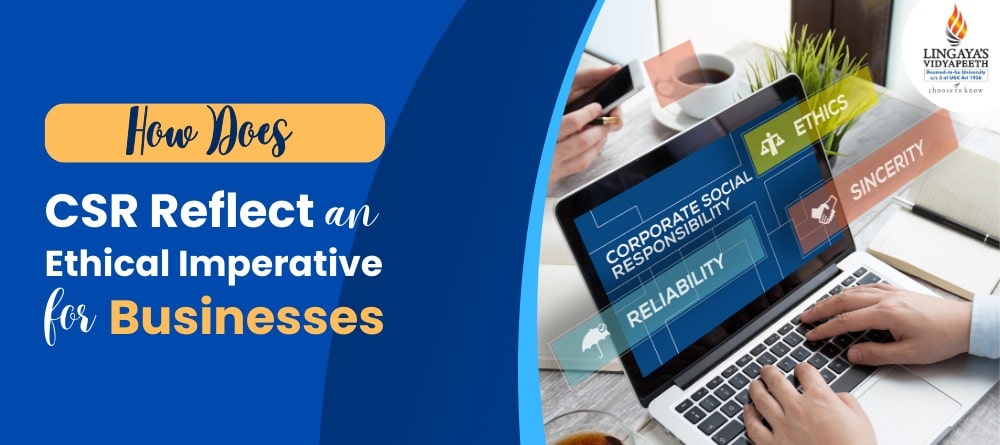Home » How Does CSR Reflect an Ethical Imperative for Businesses?

In today’s business landscape, the integration of Corporate Social Responsibility (CSR) and business ethics has become more than a trend; it’s a fundamental aspect of responsible corporate citizenship. CSR extends beyond profit motives, compelling companies to consider their impact on society, the environment, and ethical principles.
CSR, At Its Foundation
CSR, at its foundation, is a commitment to constructive social change and long-term practises. The core of these programmes is ethical corporate conduct, which emphasises a company’s responsibility to act with honesty and transparency. CSR shows a holistic approach to business that goes beyond the bottom line, ranging from environmental stewardship activities such as lowering carbon footprints and embracing sustainable practices to social impact projects that assist education and healthcare.
Moreover, ethical supply chain management ensures fair labor practices and human rights adherence, fostering a sense of responsibility across the entire business ecosystem.
Transparency and accountability are key elements, as companies openly disclose their CSR initiatives, reinforcing their commitment to ethical practices. CSR also extends to employee well-being, with initiatives supporting mental health, work-life balance, and diversity and inclusion. The impact of CSR goes beyond the immediate business sphere, influencing consumer trust and loyalty. In an era where consumers prefer brands aligned with their values, CSR becomes a powerful differentiator. Companies embracing CSR are not only contributing to societal betterment but also cultivating long-term sustainability.
As global citizens, businesses are recognizing their role in addressing global challenges, further reinforcing the interconnected nature of CSR.
Beyond Profit: Corporate Social Responsibility (CSR) and the Ethical Imperative
Ultimately, integrating CSR and ethical business practices is not just a strategic choice; it’s a commitment to enduring success and positive contributions to the world. In a landscape where stakeholders increasingly demand accountability and responsibility, embracing CSR and ethical conduct is not just a best practice—it’s an imperative for businesses aspiring to thrive in the 21st century.
This blog explores the symbiotic relationship between CSR and business ethics, highlighting the transformative impact they can have on companies and society at large.
Defining Corporate Social Responsibility (CSR):
CSR goes beyond profit-driven motivations, emphasizing a company’s need to address social, environmental, and ethical concerns. It entails a commitment to encouraging positive transformation and long-term practices.
The Ethical Imperative:
At the heart of CSR lies a commitment to ethical behavior. Businesses are increasingly recognizing the importance of aligning their practices with ethical principles, not just to comply with regulations but to build trust and long-term relationships.
Environmental Stewardship:
CSR initiatives often include environmental sustainability efforts. Companies are embracing eco-friendly practices, reducing carbon footprints, and investing in renewable energy to contribute positively to the environment.
Social Impact Initiatives:
From community development projects to supporting education and healthcare, businesses are realizing their potential to drive positive social change. CSR initiatives that address societal needs strengthen the bond between companies and the communities they serve.
Ethical Supply Chain Management:
CSR requires that ethical practices be followed across the supply chain. Companies are scrutinizing their suppliers to ensure fair labor practises, human rights compliance, and sustainable material sourcing.
Transparency and Accountability:
Transparency is required for ethical business practices. Companies are adopting transparency about their operations, providing information on CSR programmes, and holding themselves accountable for their societal impact.
Conclusion:
CSR and business ethics are more than catchphrases; they reflect a paradigm shift in corporate consciousness. Companies that incorporate these ideas into their DNA not only contribute to a better world, but also provide the groundwork for long-term success. As stakeholders increasingly demand accountability and responsible business practices, organizations that want to prosper in the twenty-first century must embrace CSR and ethical behavior.
Written By
Meenu Kumari
B.com(Hons)
1st Semester
December 7, 2023RECENT POSTS
CATEGORIES
TAGS
Agriculture Agriculture future AI Architecture Architecture design artificial intelligence BA Psychology BTech CSE BTech Engineering Business management career Career-Specific Education career guide Career Opportunities career option career scope Civil engineering commerce and management Computer Science Computer science engineering Data science degree education Engineering Engineering students English Literature english program Exam tips Fashion Design Fashion design course Higher Education Journalism journalism and mass communication law Law career Machine Learning MA Psychology Master degree mathematics MBA Mechanical Engineering Pharmacy Psychology Research and Development students
University Address: Nachauli, Jasana Road, Faridabad, Haryana
Toll Free: 1800-120-4613
Mobile : 8447744303 | 8447744304 | 8447744306 | 8447744309
Address: C-72, Second Floor, Shivalik, Near Malviya Nagar,
Above HDFC Bank, New Delhi 110017
Ph.No. - 011-46570515 / 45138169 / 41755703 / +91-7303152412
Jagmani Kutir, Ground Floor, Road No-1, Rajeev Nagar,
Near Darbar Marriage Hall, Patna-800024, Bihar
Contact No: 9818352069/ 8130120095
Mail: kanhaiya@lingayasvidyapeeth.edu.in
Copyrights © 1998 - 2025 Lingaya's Vidyapeeth (Deemed To Be University). All rights reserved.
It is important to note that the following email IDs and domains are fraudulent and do not belong to our university.
LV only conducts physical/online verification of any document related to examination on the following email id: